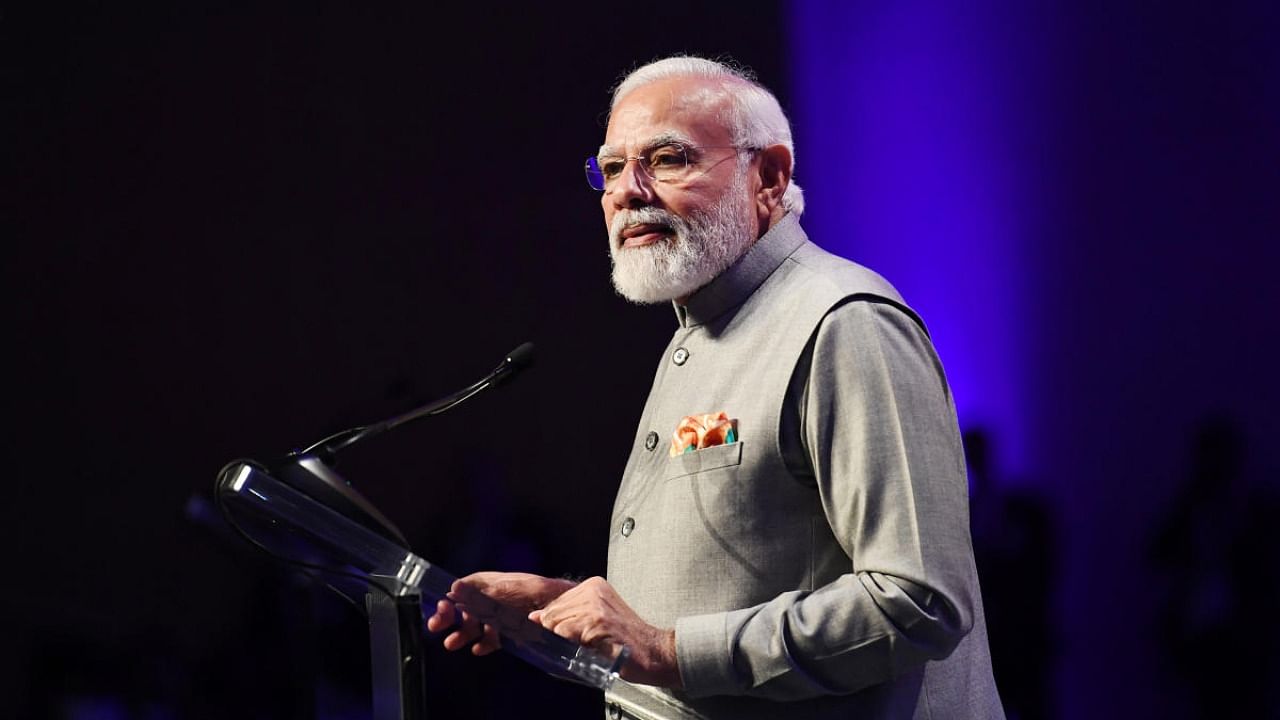
Early in his first term as India's prime minister, Narendra Modi described his government as a start-up while addressing a crowd of Indian-origin supporters in San Jose, California. He said his administration, too, had witnessed ups and downs like any start-up.
As many in his Silicon Valley audience would have known well that day in September 2015, the best founders need to be masters at pitching their fledgling firms to potential investors, offering solutions to problems that previously seemed intractable. But they would have also known a second truth about start-ups: To be successful, they must eventually deliver on their promises.
Seven years after that speech in the United States, Modi once again pitched India as a not-to-be-missed investment destination this week during a tour of Germany, Denmark and France. Yet while it is only natural for the prime minister to try and lure foreign investors, his repeated inability to live up to some of his boldest global commitments is undermining his sales deck.
As the war in Ukraine disrupts global food supplies — Russia and Ukraine are among the planet's biggest wheat exporters — Modi has promised that India will step in to feed the world. In a virtual meeting with US President Joe Biden last month, Modi said India has "enough food" for its population and was willing to supply the world "from tomorrow" if the World Trade Organization lifted restrictions on subsidised food. Meanwhile, India has convinced a previously reluctant Egypt, a major importer of Russian and Ukrainian wheat, to buy its grains instead.
But it's now clear that India's own wheat harvest will be dramatically poorer this year, in part because of the devastating heat wave scorching large parts of the country. On Wednesday, the government slashed its estimates of wheat procurement from farmers by half. A significantly lower yield of grains will force the government to dip into reserve stocks, depleting those. There is no realistic way that the Modi government can meaningfully increase wheat exports when the country's own supplies are shrinking. Under the previous BJP government of Atal Behari Vajpayee in the early 2000s, India had facilitated a surge in exports of rice and wheat without accounting for the needs of its public distribution system. New Delhi ended up having to import record volumes of wheat to make up for that miscalculation and will not want to repeat that mistake.
Simply put, the notion that India can flood the world with its wheat is a chimera.
Yet it wouldn't be the first promise Modi and his government have made to the world, only to retract later. Few Indians will have forgotten how the government in New Delhi declared victory over Covid-19 in January last year. Addressing the World Economic Forum in Davos that month, Modi committed to supplying Indian vaccines to the world to hasten the battle against the virus. But back home, his government failed to prepare for the second wave of the pandemic, ordering far fewer vaccine doses than were needed for a country of 1.4 billion people. When the devastating Delta wave pounded India in April and May 2021, India had to ban the export of its Covid-19 vaccines and medication, including remdesivir. Instead of rescuing the world, India had to turn to other countries for everything from vaccines to oxygen because of the mismatch between the government's words and its planning.
And this behaviour, it appears, is contagious. Earlier this year, Coal India Limited — the world's largest coal producer — had prepared a blueprint outlining plans to export the fossil fuel to Bangladesh, Nepal and Bhutan. While the coal behemoth has exported small amounts on an ad hoc basis previously, it has never entered into major commercial contracts.
But by then, it was already clear that global prices of fuel — oil, gas and coal — were poised to spike amid rising tensions in Europe. Climate change and unpredictable weather are no surprises anymore: Most policy planners around the world take them into account. India didn't. So as temperatures soared in March and April, the country has had to ask states to rush in coal imports. India has been unable to supply Nepal with even the electricity it usually sells to its northern neighbour. All this when India battled a coal crisis as recently as late 2021 and is more familiar with the economic and logistical challenges of the industry than almost any other nation.
To be clear, it is natural and understandable for democratic governments to prioritise domestic needs over shortages in other countries. Most other nations do so too. It's also morally right and diplomatically smart to use extra Indian resources, when available, to help other nations in need.
But when bold, public commitments to help the world aren't based on actual planning, they expose the hollowness of the development model that the government touts at home, in diplomatic meetings and at raucous diaspora jamborees like the ones that Modi loves to address. When it happens again and again, it reveals a prime minister and government disconnected from the reality of their own nation, its needs and challenges.
Tall talk — or in the words of Union Home Minister Amit Shah, a jumla — can elevate an election campaign. It almost always diminishes a nation's global standing.
(Charu Sudan Kasturi is a journalist)
Disclaimer: The views expressed above are the author's own. They do not necessarily reflect the views of DH.